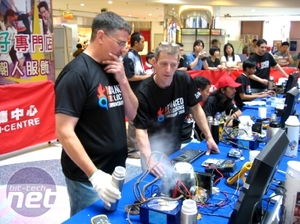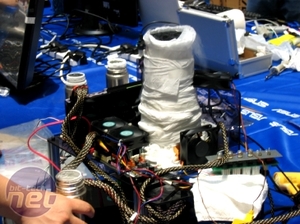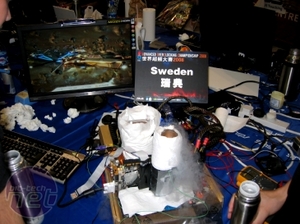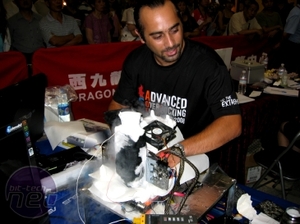
I’m sat in a cigarette smoke filled hotel room somewhere in Hong Kong, as it swelters outside the window under the hottest day this year. A middle aged man picks up an unsuspecting premium motherboard from a desk and pries the chipset cooler off of the board. He reaches into a nearby toolbox and his hand emerges with a pair of heavy duty cutters before mutilating the heatsink’s heat pipe beyond repair.
“We don’t need that,” he nonchalantly quips, “we’ll be using liquid nitrogen on the Northbridge”. Welcome to the world of Competitive Extreme Overclocking, where stock cooling is never, ever enough.
The two men feverishly dismantling the high end hardware in the room are Paul and Barry, AKA Sacha35 and BazX, the UK team taking part in this year’s Advanced Overclocking Championships (AOCC), now in its second year and held this time in the sprawling high rise of Hong Kong.
The competition, organised by website VRZone.com with the assistance of a hatful of industry leading sponsors, is fast becoming the most recognised overclocking competition in the world, and this year featured over 20 teams from across the world. bit-tech went along to learn a bit more about extreme overclocking and meet some of the faces behind the record breaking benchmark scores.
The format for the competition is pretty simple. Each team is handed identical hardware, operating systems and drivers, and compete to achieve the highest possible benchmark scores. While initially you’d think that the use of identical hardware would result in a fairly boring competition with every team recording very similar scores, the level of individual skill and experience, different cooling setups and individual silicon die quality on the hardware means that benchmarks results can vary significantly between the more experienced and better equipped teams, as well as due to the wild card of GPU and CPU quality.
Obviously the hardware used is vital to achieving the best overclock, and the event sponsors spared no expense in supplying top end hardware for the contestants to mutilate, mod, and generally have a PC hardware destruction derby with throughout the course of the event. Each team was issued with the following hardware to get stuck in with:
Motherboard: Asus P5Q3 Deluxe
Processor: Intel Core 2 Extreme QX9770
Graphics Card: Asus ENGTX280 TOP
Memory: Kingston HyperX DDR3
Hard Disk Drive: Western Digital VelociRaptor 10,000RPM HDD
Power Supply: FSP Everest Pro 1200W
However, in some circumstances, having ultra high end hardware doesn't necessarily mean better benchmark scores. In single threaded applications, a dual core processor is always preferred to a quad core, and for the most part the high FSB abilities of cheaper chips like the Intel E8500 are preferred to the unlocked multiplier of Intel's high cost X-series processors. Only in multi threaded benchmarks like 3DMark Vantage do quad core processors hold any real advantage.
“We don’t need that,” he nonchalantly quips, “we’ll be using liquid nitrogen on the Northbridge”. Welcome to the world of Competitive Extreme Overclocking, where stock cooling is never, ever enough.
The two men feverishly dismantling the high end hardware in the room are Paul and Barry, AKA Sacha35 and BazX, the UK team taking part in this year’s Advanced Overclocking Championships (AOCC), now in its second year and held this time in the sprawling high rise of Hong Kong.
The competition, organised by website VRZone.com with the assistance of a hatful of industry leading sponsors, is fast becoming the most recognised overclocking competition in the world, and this year featured over 20 teams from across the world. bit-tech went along to learn a bit more about extreme overclocking and meet some of the faces behind the record breaking benchmark scores.
The format for the competition is pretty simple. Each team is handed identical hardware, operating systems and drivers, and compete to achieve the highest possible benchmark scores. While initially you’d think that the use of identical hardware would result in a fairly boring competition with every team recording very similar scores, the level of individual skill and experience, different cooling setups and individual silicon die quality on the hardware means that benchmarks results can vary significantly between the more experienced and better equipped teams, as well as due to the wild card of GPU and CPU quality.
Obviously the hardware used is vital to achieving the best overclock, and the event sponsors spared no expense in supplying top end hardware for the contestants to mutilate, mod, and generally have a PC hardware destruction derby with throughout the course of the event. Each team was issued with the following hardware to get stuck in with:
Motherboard: Asus P5Q3 Deluxe
Processor: Intel Core 2 Extreme QX9770
Graphics Card: Asus ENGTX280 TOP
Memory: Kingston HyperX DDR3
Hard Disk Drive: Western Digital VelociRaptor 10,000RPM HDD
Power Supply: FSP Everest Pro 1200W
However, in some circumstances, having ultra high end hardware doesn't necessarily mean better benchmark scores. In single threaded applications, a dual core processor is always preferred to a quad core, and for the most part the high FSB abilities of cheaper chips like the Intel E8500 are preferred to the unlocked multiplier of Intel's high cost X-series processors. Only in multi threaded benchmarks like 3DMark Vantage do quad core processors hold any real advantage.

MSI MPG Velox 100R Chassis Review
October 14 2021 | 15:04












Want to comment? Please log in.